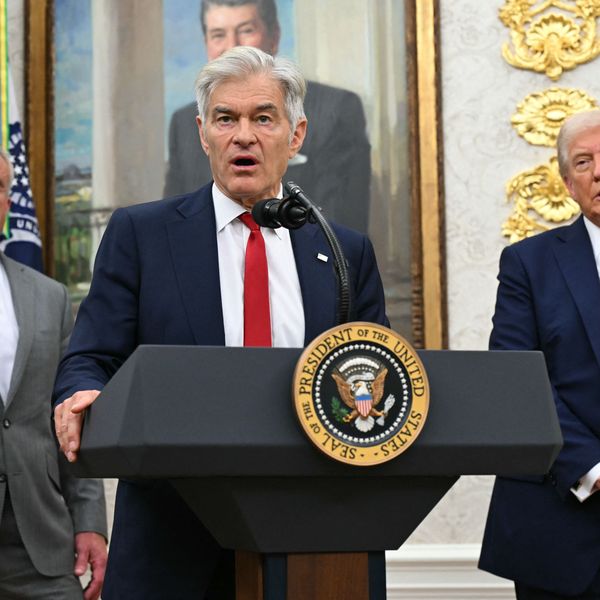
A demonstrator hold a sign demanding lower drug prices during a protest in Manhattan, New York on August 16, 2023.
Federal Judge Dismisses Pharma Giant's Challenge to Medicare Drug Price Negotiations
"The court has rejected AstraZeneca's self-serving arguments and essentially said the company didn't have a leg to stand on," said one advocate.
The president of consumer advocacy group Public Citizen on Friday urged Big Pharma to "drop its far-fetched lawsuits and accept that the era of Medicare price negotiation is here to stay," after a federal judge in Delaware rejected drug company AstraZeneca's case challenging provisions under the Inflation Reduction Act.
AstraZeneca Pharmaceuticals LP et al. v. Becerra et al. is one of several cases that drug companies have filed against the federal government seeking to block Medicare from negotiating drug prices on behalf of patients—as the governments of every other high-income country do, with Americans paying as much as four times what people in countries such as the United Kingdom and Canada pay for their medications.
The company claimed that the Centers for Medicare & Medicaid Services violated the Administrative Procedure Act.
Chief Judge Colm Connolly in the U.S. District Court for the District of Delaware ruled that "because AstraZeneca's participation in Medicare is not involuntary, AstraZeneca does not have a protected property interest in selling drugs to the government at prices the government will not agree to pay. Accordingly, AstraZeneca's due process claim fails as a matter of law."
"Drug corporations have no constitutional right to price gouge Medicare, contrary to Big Pharma's claims."
In other words, said Patients for Affordable Drugs (P4AD), the judge emphasized that "the company's desire for higher prices does not supersede the government's ability to protect patient interests."
"On behalf of patients across this country, we are encouraged but not surprised that the court has rejected AstraZeneca's self-serving arguments and essentially said the company didn't have a leg to stand on," said Merith Basey, the group's executive director. "This ruling sends a clear message that Big Pharma's greed cannot continue to be prioritized over patients' well-being and underscores the importance of Medicare negotiation to begin to rein in exorbitant drug prices."
"The judge's decision reaffirms that pharmaceutical companies like AstraZeneca have the option to participate in Medicare voluntarily, accepting slightly lower negotiated prices if they wish to access a market worth billions," added Basey. "Once again, a judge has reviewed drug company claims, and the result has gone against the drug company and for the people of the United States."
AstraZeneca's drug Farxiga, which is used to treat Type 2 diabetes, was one of 10 medications selected by the Biden administration last year for the first round of negotiations under the Inflation Reduction Act's (IRA) Medicare Drug Price Negotiation Program. In 2022, the company reported nearly $4.4 billion in revenue from Farxiga.
P4AD said Connolly's ruling was a victory for patients like Karen, a Pueblo West, Colorado resident.
"I am on Medicare and was prescribed Farxiga with a bill of over $600 for a three-month supply. I am on a fixed income and can no way afford that amount of money," Karen told the group, which has signed onto amicus briefs in seven different cases regarding Medicare price negotiations.
Tony Carrk, executive director of Accountable.US, noted that Big Pharma previously spent millions lobbying against the drug price negotiation provisions in the IRA.
“Big drug company executives are stopping at nothing to price gouge Americans and pad their profits," said Carrk. "Now they are trying to do it by clogging the judicial system with meritless lawsuits. Today's ruling is a victory for the Biden administration's historic cost-lowering program and for seniors who need lower prescription drug costs."
Robert Weissman, president of Public Citizen, pointed out that the IRA's restraints on Big Pharma's price gouging are only "modest" but will make a difference to seniors, saving $100 billion over a decade.
"In response, Big Pharma has launched a flurry of preposterous lawsuits against the Medicare drug negotiation provisions in the Inflation Reduction Act," said Weissman. "As Public Citizen has argued in amicus briefs, drug corporations have no constitutional right to price gouge Medicare, contrary to Big Pharma's claims."
Weissman said his expects that with seven pending cases, "today's decision is the first of many rejecting Big Pharma's attack on the act's effort to rein in exorbitant prescription drug prices."
An Urgent Message From Our Co-Founder
Dear Common Dreams reader, The U.S. is on a fast track to authoritarianism like nothing I've ever seen. Meanwhile, corporate news outlets are utterly capitulating to Trump, twisting their coverage to avoid drawing his ire while lining up to stuff cash in his pockets. That's why I believe that Common Dreams is doing the best and most consequential reporting that we've ever done. Our small but mighty team is a progressive reporting powerhouse, covering the news every day that the corporate media never will. Our mission has always been simple: To inform. To inspire. And to ignite change for the common good. Now here's the key piece that I want all our readers to understand: None of this would be possible without your financial support. That's not just some fundraising cliche. It's the absolute and literal truth. We don't accept corporate advertising and never will. We don't have a paywall because we don't think people should be blocked from critical news based on their ability to pay. Everything we do is funded by the donations of readers like you. Will you donate now to help power the nonprofit, independent reporting of Common Dreams? Thank you for being a vital member of our community. Together, we can keep independent journalism alive when it’s needed most. - Craig Brown, Co-founder |
The president of consumer advocacy group Public Citizen on Friday urged Big Pharma to "drop its far-fetched lawsuits and accept that the era of Medicare price negotiation is here to stay," after a federal judge in Delaware rejected drug company AstraZeneca's case challenging provisions under the Inflation Reduction Act.
AstraZeneca Pharmaceuticals LP et al. v. Becerra et al. is one of several cases that drug companies have filed against the federal government seeking to block Medicare from negotiating drug prices on behalf of patients—as the governments of every other high-income country do, with Americans paying as much as four times what people in countries such as the United Kingdom and Canada pay for their medications.
The company claimed that the Centers for Medicare & Medicaid Services violated the Administrative Procedure Act.
Chief Judge Colm Connolly in the U.S. District Court for the District of Delaware ruled that "because AstraZeneca's participation in Medicare is not involuntary, AstraZeneca does not have a protected property interest in selling drugs to the government at prices the government will not agree to pay. Accordingly, AstraZeneca's due process claim fails as a matter of law."
"Drug corporations have no constitutional right to price gouge Medicare, contrary to Big Pharma's claims."
In other words, said Patients for Affordable Drugs (P4AD), the judge emphasized that "the company's desire for higher prices does not supersede the government's ability to protect patient interests."
"On behalf of patients across this country, we are encouraged but not surprised that the court has rejected AstraZeneca's self-serving arguments and essentially said the company didn't have a leg to stand on," said Merith Basey, the group's executive director. "This ruling sends a clear message that Big Pharma's greed cannot continue to be prioritized over patients' well-being and underscores the importance of Medicare negotiation to begin to rein in exorbitant drug prices."
"The judge's decision reaffirms that pharmaceutical companies like AstraZeneca have the option to participate in Medicare voluntarily, accepting slightly lower negotiated prices if they wish to access a market worth billions," added Basey. "Once again, a judge has reviewed drug company claims, and the result has gone against the drug company and for the people of the United States."
AstraZeneca's drug Farxiga, which is used to treat Type 2 diabetes, was one of 10 medications selected by the Biden administration last year for the first round of negotiations under the Inflation Reduction Act's (IRA) Medicare Drug Price Negotiation Program. In 2022, the company reported nearly $4.4 billion in revenue from Farxiga.
P4AD said Connolly's ruling was a victory for patients like Karen, a Pueblo West, Colorado resident.
"I am on Medicare and was prescribed Farxiga with a bill of over $600 for a three-month supply. I am on a fixed income and can no way afford that amount of money," Karen told the group, which has signed onto amicus briefs in seven different cases regarding Medicare price negotiations.
Tony Carrk, executive director of Accountable.US, noted that Big Pharma previously spent millions lobbying against the drug price negotiation provisions in the IRA.
“Big drug company executives are stopping at nothing to price gouge Americans and pad their profits," said Carrk. "Now they are trying to do it by clogging the judicial system with meritless lawsuits. Today's ruling is a victory for the Biden administration's historic cost-lowering program and for seniors who need lower prescription drug costs."
Robert Weissman, president of Public Citizen, pointed out that the IRA's restraints on Big Pharma's price gouging are only "modest" but will make a difference to seniors, saving $100 billion over a decade.
"In response, Big Pharma has launched a flurry of preposterous lawsuits against the Medicare drug negotiation provisions in the Inflation Reduction Act," said Weissman. "As Public Citizen has argued in amicus briefs, drug corporations have no constitutional right to price gouge Medicare, contrary to Big Pharma's claims."
Weissman said his expects that with seven pending cases, "today's decision is the first of many rejecting Big Pharma's attack on the act's effort to rein in exorbitant prescription drug prices."
- Pharma Giants to Hike 350+ US Drug Prices in the New Year: Analysis ›
- 'Watershed Moment': Biden Admin Unveils First 10 Drugs Subject to Medicare Price Negotiations ›
- Watchdog Calls On Judge With Pharma Investments to Recuse From Drug Pricing Case ›
- Despite Profit Surge, Novartis Still Suing to Prevent Lower Drug Prices | Common Dreams ›
The president of consumer advocacy group Public Citizen on Friday urged Big Pharma to "drop its far-fetched lawsuits and accept that the era of Medicare price negotiation is here to stay," after a federal judge in Delaware rejected drug company AstraZeneca's case challenging provisions under the Inflation Reduction Act.
AstraZeneca Pharmaceuticals LP et al. v. Becerra et al. is one of several cases that drug companies have filed against the federal government seeking to block Medicare from negotiating drug prices on behalf of patients—as the governments of every other high-income country do, with Americans paying as much as four times what people in countries such as the United Kingdom and Canada pay for their medications.
The company claimed that the Centers for Medicare & Medicaid Services violated the Administrative Procedure Act.
Chief Judge Colm Connolly in the U.S. District Court for the District of Delaware ruled that "because AstraZeneca's participation in Medicare is not involuntary, AstraZeneca does not have a protected property interest in selling drugs to the government at prices the government will not agree to pay. Accordingly, AstraZeneca's due process claim fails as a matter of law."
"Drug corporations have no constitutional right to price gouge Medicare, contrary to Big Pharma's claims."
In other words, said Patients for Affordable Drugs (P4AD), the judge emphasized that "the company's desire for higher prices does not supersede the government's ability to protect patient interests."
"On behalf of patients across this country, we are encouraged but not surprised that the court has rejected AstraZeneca's self-serving arguments and essentially said the company didn't have a leg to stand on," said Merith Basey, the group's executive director. "This ruling sends a clear message that Big Pharma's greed cannot continue to be prioritized over patients' well-being and underscores the importance of Medicare negotiation to begin to rein in exorbitant drug prices."
"The judge's decision reaffirms that pharmaceutical companies like AstraZeneca have the option to participate in Medicare voluntarily, accepting slightly lower negotiated prices if they wish to access a market worth billions," added Basey. "Once again, a judge has reviewed drug company claims, and the result has gone against the drug company and for the people of the United States."
AstraZeneca's drug Farxiga, which is used to treat Type 2 diabetes, was one of 10 medications selected by the Biden administration last year for the first round of negotiations under the Inflation Reduction Act's (IRA) Medicare Drug Price Negotiation Program. In 2022, the company reported nearly $4.4 billion in revenue from Farxiga.
P4AD said Connolly's ruling was a victory for patients like Karen, a Pueblo West, Colorado resident.
"I am on Medicare and was prescribed Farxiga with a bill of over $600 for a three-month supply. I am on a fixed income and can no way afford that amount of money," Karen told the group, which has signed onto amicus briefs in seven different cases regarding Medicare price negotiations.
Tony Carrk, executive director of Accountable.US, noted that Big Pharma previously spent millions lobbying against the drug price negotiation provisions in the IRA.
“Big drug company executives are stopping at nothing to price gouge Americans and pad their profits," said Carrk. "Now they are trying to do it by clogging the judicial system with meritless lawsuits. Today's ruling is a victory for the Biden administration's historic cost-lowering program and for seniors who need lower prescription drug costs."
Robert Weissman, president of Public Citizen, pointed out that the IRA's restraints on Big Pharma's price gouging are only "modest" but will make a difference to seniors, saving $100 billion over a decade.
"In response, Big Pharma has launched a flurry of preposterous lawsuits against the Medicare drug negotiation provisions in the Inflation Reduction Act," said Weissman. "As Public Citizen has argued in amicus briefs, drug corporations have no constitutional right to price gouge Medicare, contrary to Big Pharma's claims."
Weissman said his expects that with seven pending cases, "today's decision is the first of many rejecting Big Pharma's attack on the act's effort to rein in exorbitant prescription drug prices."
- Pharma Giants to Hike 350+ US Drug Prices in the New Year: Analysis ›
- 'Watershed Moment': Biden Admin Unveils First 10 Drugs Subject to Medicare Price Negotiations ›
- Watchdog Calls On Judge With Pharma Investments to Recuse From Drug Pricing Case ›
- Despite Profit Surge, Novartis Still Suing to Prevent Lower Drug Prices | Common Dreams ›

